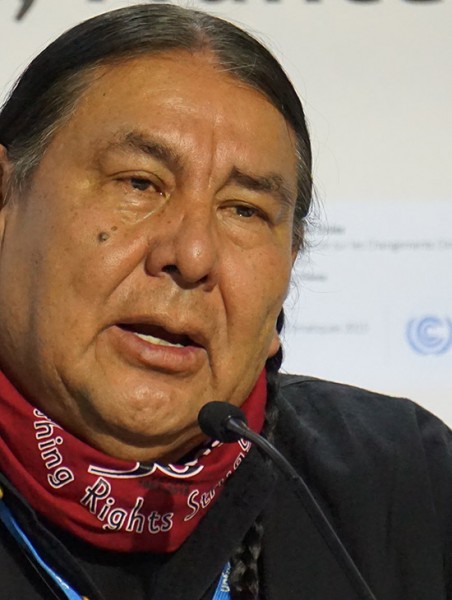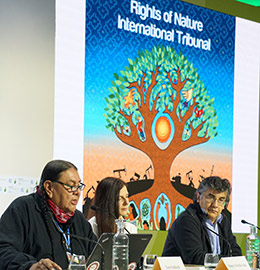Dec 9, 2015 COP21, Paris
Tom Goldtooth, of the Indigenous Environmental Network appeared as part of a panel discussion with Pablo Salon and Osprey Orielle Lake, Executive Director of WECAN on the International Rights Of Nature Tribunal.

“The tribunal found that mother earth is a source of life which needs to be protected, and not a resource to be exploited and commodified as natural capital” ~ Tom Goldtooth
Transcription
“I’m glad to be here, and I was the tribunal judge for the topic of financialization of nature.â€
“The tribunal members as far as, civil society, indigenous peoples, members of La Via Campesina, peasants and small farmers, especially people of the Global South, we’re very concerned of the escalation of the market system. Not only within the negotiations here of this COP 21. but outside of the COP, with movements such as the biodiversity offset movement here in Europe, conservation offsets. And it was all bundled up with the concern about is this part of a movement of objectification by capitalism, by corporations, and with support of the financial institutions, like development banks, regional development banks, the World Bank, Chase Manhattan, as well as investment from extractive energy, including governments like Norway.â€
“And as we looked at this issue and brought this case before this tribunal in Paris, we found moving evidence by experts and witnesses that this critical topic of financialization of nature is rapidly become the vocabulary of nature conservation debate. In fact it’s the main mechanism that has been incorporated within the Paris Agreement. Within the Paris Agreement you’ve got the article section that emphasizes in cloaked terminology a market mechanism being presented as a mechanism for sustainable development.â€
“That brings up a lot of concerns of course, in addition to the rights of mother earth, the rights of nature, is the tremendous risk on violation of human rights, including the rights of indigenous peoples. As we looked and explored this, market mechanisms, we had to look at various free market economies, carbon trading, carbon offsets, clean development mechanisms, and other market mechanisms that allow the polluter to profit while the impacts of climate change and the world still has disproportionate impact to ethnic communities, indigenous communities, in the North, people of color, low income, where polluting companies in the North like Chevron continue to expand their release of toxic emissions contribution to greenhouse gas concentrations while they buy and rent trees in the Global South.â€
“The tribunal found evidence that the financialization of nature process separates and quantifies the earth cycles and functions such as carbon, water, forest, fauna and biodiversity, turning them into units to be sold in financial and speculative markets. This includes the mechanism of reducing emissions from deforestation and forest degradation known as REDD, including payment for environmental services all bundled up as as a form of objectification of the sacredness of mother earth. With many indigenous people that have testified, this is also a violation of the traditional indigenous cosmo-vision.â€
“So that conclusion was yes, this financialization of nature is part of a green economy regime that puts a monetary price on nature, on mother earth, as part of a derivative market that would only increase the destruction of mother earth. The tribunal found that mother earth is a source of life which needs to be protected, and not a resource to be exploited and commodified as natural capital.â€
“So the tribunal found that they will keep this case open and continue to hear cases of where these market mechanisms continue to violate the universal declaration on the rights of mother earth. Its a very serious issue when it’s the main mitigation solution that’s emerging out of this COP 21. Thank you very muchâ€
Q & A
“The biggest challenge to the dominant society, the biggest challenge to the populations of an industrialized society is that they have been removed from nature. Whatever that history is here in Europe, people from Europe migrated and occupied our territories in United States. They didn’t understand what their own relationship was with the mother earth. Some of the small farmers did, but not the collectivity of the settlers who came.â€
“So indigenous people, we have that relationship to that sacredness, but we have a situation of colonization, that separates our life, uses our natural environment, trees for an example, as part of a resource, not for us, not for us, whether it’s water, but a resource to feed the world. So the world’s out of balance. As we fight for our own survival – because this climate issue is a life and death issue. So we are trying to address our own issues for survival, and yes, sometimes we get challenged with trying to find a balance on what that direction is. And with the temptations of big money, I’m talking millions of dollars, from the World Bank, and other NGOs, and foundations and countries like Norway, throwing millions of dollars down to support a false solution like carbon market system, tears at the fabric of our peoples. That’s the danger. And I’ve seen that fragmentation. But we’re going to work it out ourselves, we’re going to work it out ourselves. Thank you.â€
Also see Tom Goldtooth’s earlier post briefing statements
Report by James George

